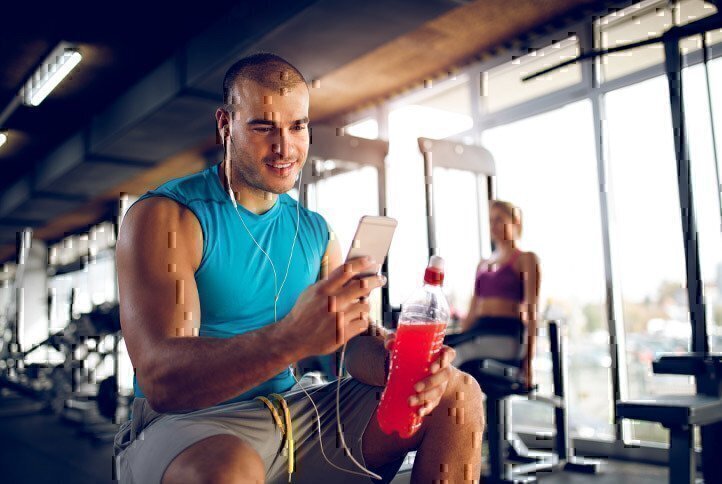Do you take your phone in the gym with you? Why do you do that? Do you realize that social media is affecting your workout?
Some people have valid reasons, because their work requires them to be on standby, available at a moment’s notice. Doctors, reserve pilots, folks who are “on call” in case of an emergency or staff shortage. Other people run companies and need to be available due to high tempo business demands. And some people just like to keep their phone handy in case their family or significant other calls.
But what about the social media addicts hopping on their phone between sets to scroll through feeds? Or those feeling that constant burning to take endless selfies and post them… and then start replying to comments? You know who you are!
This craving for social media has turned into a global obsession, and not a very healthy one. Smartphones have only become “popular” within the past ten years. And yet you’d think we were all born with phones growing out of us like appendages.
This ubiquitous access to handheld mobile computers has given rise to the dominion of social media over our lives. YouTube, Facebook, Instagram, Twitter and Snapchat have waged—and are winning—a silent war for our attention spans. And they’re not just distracting us from our daily routines. They’re actually altering them.

Social Media Addiction
Social media works almost like a drug, with its built-in system of instant feedback and rewards. Who doesn’t like getting a nice “thumbs up” or “heart?” We all do, because these icons were specifically designed to trigger positive feelings in us.
The more we receive, the more we feel valued by friends, casual acquaintances and… random followers? Yes, even people we’ve never met (and never will) are influencing our emotional states by hitting (or not hitting) a tiny heart or thumb icon. And we don’t even recognize the impact these tiny actions have on us, other than a vague and passing feeling that we like to see responses, and we’re bummed when we don’t get them. Like Pavlov’s dogs, we have become conditioned to the respond to these stimuli.
How did humanity get to this point? And is it really such a bad thing?
The Biochemistry Factor
Obviously we “get here” by being predictable humans susceptible to market analysis.
Companies and developers study us and create addictive apps which loop us into a cycle of constant checking. Our brains, hooked on the release of dopamine, are drawn to the lure of social media like moths to a flame. But dopamine is meant to help motivate us towards goals. Social media hacks our own chemical responses, tricking them into wasteful dead ends. When social media is affecting your workout, it’s also affecting your brain.
This derails us from following up on our plans. Using the gym as an example, social media use can not only distract us from our plans to hit the gym, but interfere with our actions while we are there, cutting into our workout time. By shifting focus to our phones, these apps decrease our focus on what our actual goal was—to squeeze in a workout!
Social media has built new goals for us, and engineered us to spend time working towards them. Cui bono? Not us!
This isn’t conspiracy theory ravings. Studies demonstrate that people spend up to 11 hours a day interacting with some form of media or screen. Whether it is from using a computer or tablet, playing a game, watching television or using a phone, we’re spending our waking time on devices.

The Importance of Dedicated Gym Time
Our gym time is one of the few periods of the day where we can escape, cut the cord and spend our energy to improve our fitness. These sessions are incredibly important for our health and quality of life. Like sleep, which functions to allow our minds to refresh and rejuvenate, exercise gives our bodies a chance to stretch, move and strengthen while our minds decompress.
And unlike the false “fix” we get from social media’s deception of our dopamine, exercise gives us a natural mental boost, increasing blood flow to deliver oxygen and nutrients to our brains while also releasing endorphins. These helpful hormones enhance mood and even decrease perception of pain… and we can make them kick in at the gym, while improving our cardiovascular health, building up muscle mass and increasing bone density through working out!
Long story short, social media isn’t doing us any favors. At a minimum too much of it wastes our time, and at its worst it negatively affects our ability to get things done. Most things are fine in moderation, but must we really dedicate over two hours a day writing witty reposts on Facebook or sharing memes and photos of ourselves going about our mundane daily affairs?
Imagine if social media didn’t exist, and we could just free up those 730+ hours a year to devote to our relationships with our loved ones, or practicing an instrument, working towards a degree, learning a new language… or getting in the best physical condition of our lives! Social media is affecting your workout. Don’t let it.
READ NEXT
7 Gym Essentials to Build an At-Home Gym









